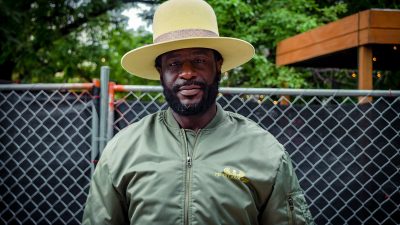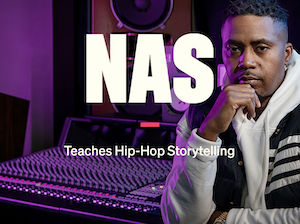Whose job is it to play new music?

text: Michael Raine | photography: Brian Patterson
Good new music, particularly what is generally termed “indie music,” hardly gets played on the radio.
It’s an old lament, one that has been repeated ad nausea by online music writers since there was such a thing as “online music writers.” But what most of the writing on this topic points at, implicitly or explicitly, is that it’s radio’s job to play new music and break new bands. By not doing so, modern rock radio is not doing its job and is therefore letting down music fans.
Well, guess what, according to those in charge of music radio programming, it’s not radio’s job to play new music so we should all stop our whining. “It’s not radio’s job to break new music,” Dave Farough, Vice President, Brands and Programming for Corus Entertainment’s 37 commercial stations including 102.1 The Edge in Toronto, told Maclean’s magazine in a recent article about why indie music is currently being heard everywhere except on mainstream rock radio. He added, “In some cases, listeners want to hear new music. But in most cases they just want to hear what they like.”
Now, I was planning on writing about completely different topic when I plopped my laptop onto my lap to write this column but then I was distracted by this Maclean’s article via my usual morning visit to Alan Cross’ website. Farough’s comments boldly confirmed something I have long suspected but hadn’t heard anyone in a position of authority say outright. That new rock radio is no longer interested in, or even in the business of, playing music by new bands.
My first reaction was to think, What the hell does he mean ‘it’s not radio’s job to break new music’? After all, breaking new music has been the hallmark of rock radio since the format was invented, especially with the creation of pirate stations such as Radio Luxembourg in 1960s. For decades people turned to radio disc jockeys like Wolfman Jack and John Peel – whose personalities and musical tastes made them into celebrities in their own rights – to hear the best new music.
Of course, it’s been a long time – or maybe the Internet’s acceleration of pop culture just makes it seem like a long time, but that’s a whole other topic – since eager music fans needed radio to discover new music. There are now more websites and blogs dedicated to new music than any one person can keep track of and they exist alongside a growing number of internet radio stations and streaming services, which can be accessed anywhere you go via a smartphone.
Given that it’s now easier to hear new music than ever before, it’s a little silly to fret over the death of indie music on mainstream radio, unless you want to partake in some nostalgic wallowing.
That being said, while it may not be, and maybe never was the job of radio to break new music, it certainly held that role for a long time and has since gradually given it up. There are number of reasons for this including the decline of independent DJs, who are no longer free to play what they want but instead must select songs from an increasingly shorter pre-approved playlist, and the fact that more and more stations are owned by fewer and fewer companies, including Chorus Entertainment.
While appeasing the aging Gen X crowd by playing a ton of Nirvana, Foo Fighters, and Pearl Jam, along with Blind Melon’s one hit song, over and over may make short-term sense for rock radio, it could spell the end of rock radio in the long-term.
That’s because while radio is still a staggeringly popular medium, it’s losing its relevance for the younger generation.
According to BBM statistics sited in the Maclean’s article, radio listenership and profits are as strong as ever and the percentage of the population that has access to radio is in the low-90s. However, the BBM stats also showed that while the average Canadian spends 17 and a half hours per week listening to the radio, that number drops to 12 hours per week among 17 to 24-years-olds. In fact, the number of hours spent listening to radio among that younger age bracket is declining three times faster than the national average.
There is a chicken and the egg scenario here. Are young music fans not listening to radio because they don’t hear any new music, or is there no new music because young music fans aren’t listening?
As Farough explained to Maclean’s, Toronto station The Edge’s average listener is 30-years-old and “grew up on ‘90s music and they still want to hear it, so that’s what we give them.”
That’s all fine and good in the short-term, but what happens when the current crop of 18-year-old music fans turn 30 and Nirvana can officially be categorized as “classic rock”? For one, these listeners will have no attachment to any radio station because no radio station ever played music directed to them and, second, radio programmers will have a very limited working knowledge of what songs have a sentimental or nostalgic appeal for this age group.
That is why some are rightfully calling for a revitalized effort toward music discovery. “The [music] discovery process on TV is running full tilt,” writes Dan Halyburton, EVP at McVay, Cook and Associates, which advises newspapers, radio stations, and magazines on developing their interactive divisions. “If every radio station found just a couple of artists that they truly thought would speak to their audience and committed to make them ‘important’ to their audience, Radio could make a difference and our time honoured role as a musical discovery medium could be preserved. There is more corporate influence in playlists today than since the days of [radio programmer] Bill Drake. I don’t believe for a second that there will be a wholesale change, but if individual stations made ‘Discovery’ a goal, Artists, Stations and, most importantly, our listeners would all WIN.”
Halyburton’s evaluation touches on key aspect that is necessary to get indie music back on the radio and breaking new music a priority. As music fans, we can’t expect radio stations to start playing new music out of sense of duty, as Farough made painfully clear. But if radio stations realize that playing at least some indie music makes long-term business sense, then don’t be surprised if you start hearing White Rabbits, or whoever else you’re into, on the local new rock station.
Then again, this is only necessary if music fans actually care what gets played on the radio or even if new rock radio survives. The more I think about it, the more I agree with Farough. It isn’t radio’s job to break bands, that job has been taken over by the blogs and online magazines. But it is a role that radio once held and is giving up at its own expense. But for us fans, as long as there is new music and we can find it and hear whenever we want, does it really matter where it’s coming from? For us, no, it doesn’t, but it should matter a great deal for people like Farough. If only he could realize it.














